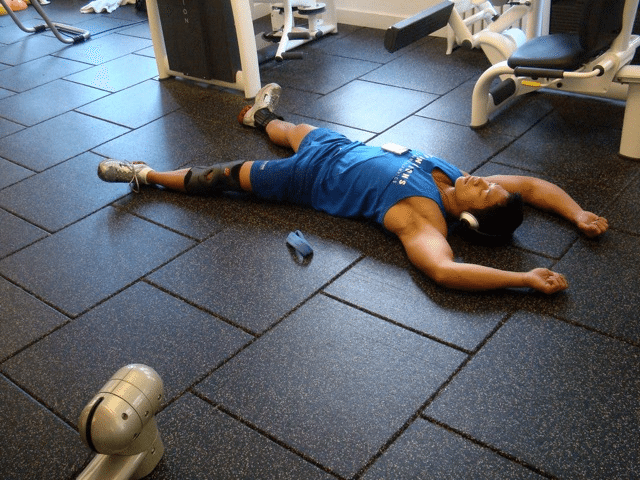Well, there are a few different things at play, and we’ll cover those below, as well as how to fix them. The good news is this: you are a hard worker, and because of that, you are the type of person that usually sees great results from exercise – because you are willing to push your body’s limits. More good news, your threshold before this feeling hits will increase. It will take more and more volume, intensity, and duration to experience this feeling, the more fit and healthy you become.
.
1) Dehydration – when you exercise, your sweat rate increases exponentially over your resting sweat rate. You cannot just “drink as usual” and expect to be ok. You must increase your water intake before and after exercise, especially if you are working too hard during exercise to keep up with hydration needs. Compensating for this loss with plenty of water will make you feel better.
.
2) Acid Buildup / Buffering – when you challenge the glycolytic energy system with high-rep weight training, you burn sugar, which results in lactic acid. Your body attempts to buffer the acid buildup, but the exposure of your cells and blood to much higher acid levels than you are used to handling can leave you feeling nauseated for a while. However, the more frequently you push this system, the better your body becomes at buffering this acid. Basically the same workload becomes easier and easier for both you and your body to handle. It’s called “increasing your lactate threshold,” and it’s a big marker of your fitness. Eating a diet high in fresh fruits and vegetables, which “pre-tax” your body’s buffering systems the least by hitting your blood with more alkalinity than acid, will help you feel better while workout out.
.
3) Muscle Tissue Damage – when you stress your muscles, you are making little tears in them, on purpose, knowing that the body will not only make the necessary repairs, but also increase the strength/size of the fiber to help prevent future tears. So it stands to reason, that you will not always feel so great while the body is responding with inflammation to those tears. Some light aerobic activity after an intense resistance training session can keep blood circulating and help the body better handle the damage and take care of the “rubble” immediately after a tough workout.
.
4) Nervous System Exchange – you have 2 “sub-nervous” systems, if you will. The sympathetic, which controls skeletal muscle and external energy, and the parasympathetic, which controls internal smooth muscle like that which moves food through your digestive tract. These 2 systems are negatively correlated. Meaning, when one is working hard, the other will take a rest. During exercise, your sympathetic nervous system is stimulated with adrenaline, so your internals will take a break. Their time off can sometimes cause some stomach upset, until the exercise “buzz” wears off. (Conversely, this is why we don’t feel like expending any external energy after big meals.) A short cool-down period of “active rest” will help transition you back to daily life, much like a warm up transitions you into intense exercise.
.
5) Electrolyte Balance – this is more of a problem for individuals exercising for long durations and/or in high temperatures. A banana with a little salt sprinkled on it is usually sufficient to correct most problems. If you are training in the heat for more than an hour and replacing lots of fluids, be sure to use a mixture like 50% apple juice, 50% water, and an 1/8 tsp salt per 20oz of this drink. The reason is to avoid hyponatremia, an extremely low blood-sodium condition that results when combining electrolyte loss and extreme re-hydration without minerals. If this happens, you can say goodbye to the world for about 2 days, and hopefully, your friends will fill you in upon your return as to what transpired during your absence. This is serious, but again, only a concern if you are exercising intensely for a long duration with a high sweat rate. I don’t suggest drinking juice or Gatorade during every indoor 45-minute resistance training workout.
I hope this helps put this occasional nauseous feeling into perspective. We don’t enjoy it, and it’s not necessary. But if you have hit that wall, at least you are pushing yourself. Now just make sure the aforementioned things are tended to, so you can continue to do so!





























